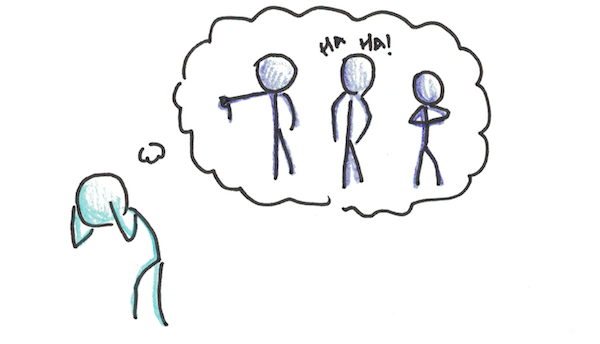
Human beings are social animals, and so it’s by design that we’re obsessed what other people think of us. Being ostracized was a death sentence in premodern times, so it wasn’t an irrational fear.
Yet, worrying what people think of you can be a huge obstacle to doing things. We live in a world with countless people. No matter what you do, some of those people won’t approve. That feeling that somebody, somewhere, might be judging you can kill your motivation to work on important things.
Here’s a few strategies I’ve used to worry less about this:
1. People don’t think about you much at all.
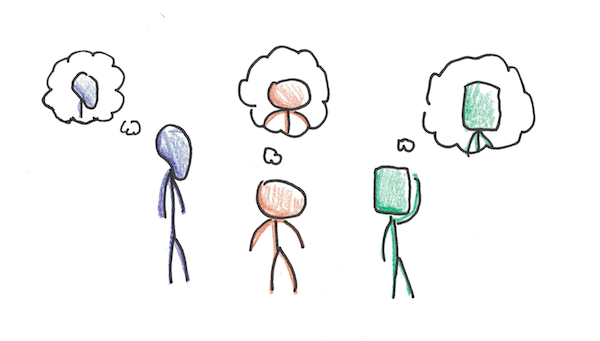
The first thing is to realize that, generally speaking, people aren’t thinking about you at all. The content of your self-conscious worries are exaggerated, not because they’re overly pessimistic but because they’re overly narcissistic.
People mostly think of themselves, including you, and that means their thoughts about others are shallow and infrequent.
Once you realize this, it’s actually kind of liberating. Even if you can’t always convince yourself that people don’t secretly despise you, it’s easier to at least convince yourself that most people aren’t thinking much about you at all. That means your mistakes, social gaffes and faux pas rarely stick out as much as you think.
2. Trying not to be an asshole is most the battle.
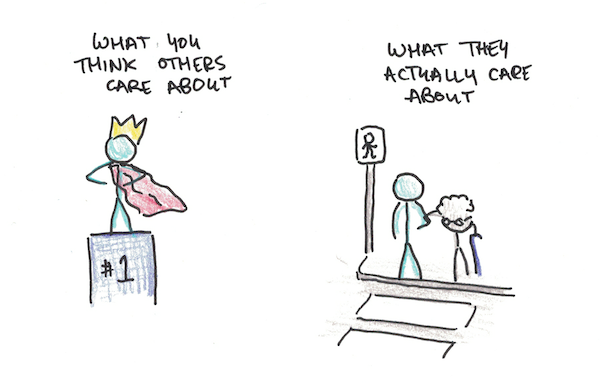
I once had a conversation with a friend of mine, who is a clinical psychologist, and we both talked about our high need for achievement. She told me that she often feels the need to do things well, otherwise people might judge her incompetent and not like her as much as a result. This is a feeling I’ve definitely struggled with.
It took her some work to realize that most people don’t really care how good you are at things. People like other people because they’re nice and fun to be around, not because of their accomplishments.
Being nice matters, and trying to be nice is most of being nice. Even if you occasionally say something you shouldn’t and embarrass yourself, or if you’re accidentally rude or insensitive, people who are trying to be nice can usually recover.
The lesson? When people do think about you, the focus is usually on whether you’re nice to be around. Everything else you think other people care about, whether those are your accomplishments, eccentricities, abilities or self-importance usually don’t matter.
3. It’s okay to keep things to yourself.
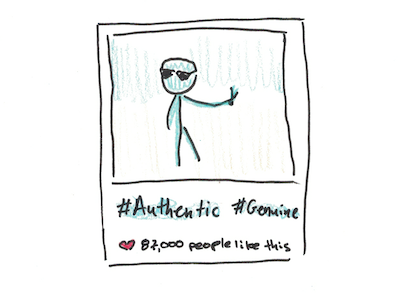
I have a problem with authenticity. Countless YouTubers and Instagram influencers have created the impression that if you’re not sharing every pimple and failure in your life that you’re being fake.
Privacy and secrecy are not evil things. If you have something you want to do, but aren’t sure you’re ready to share it with people yet, there’s nothing wrong with keeping it to yourself.
When I first started my blog, I was really interested in personal development, but none of my friends or family were. So, I mostly didn’t tell them about my blog. I didn’t publish on social networks or post live video feeds of what I was doing. I kept it to myself.
At the time, I felt guilty. Like I was hiding or doing something inappropriate because I was worried what other people might think of me. Now, however, I think there’s nothing wrong with keeping things to yourself. Don’t let people guilt you into thinking you need to share everything or else you’re a phony. Often it’s the people who share “everything” that are the real fakers.
4. Care what YOU think a lot more.
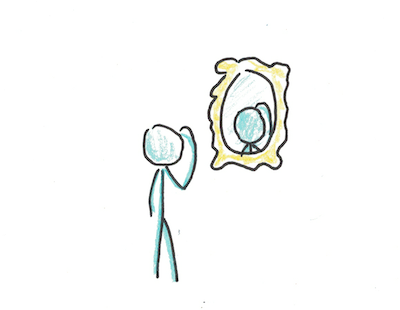
Worries are often roughly in an equilibrium in your mind. Meaning that if you add more worries, it tends to make other worries quieter. Similarly, if other worries get quiet, it makes new ones pop up in their place.
The best example of this is anyone who has ever gone through a health crisis, either themselves or with loved ones. Suddenly the problems that seemed so pressing and anxiety-inducing disappear as this new, bigger problem fills your entire consciousness.
You can use this to your advantage by esteeming your own self-opinion of your projects, decisions and goals a lot higher than you do others’ opinions. An overly harsh self-critique can itself become a problem, but I’d much rather live worrying that I didn’t like my own work than rush around trying to please all the imaginary outsiders’ opinions.
Really ask what you think, and care about the answer more than what others’ think.
5. Acknowledge the worries and get on with life anyways.
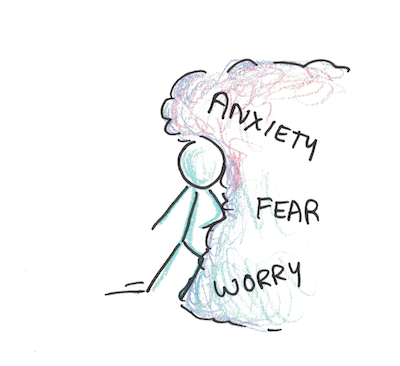
To a certain extent, you may be unable to control how much you worry or obsess over what other people think of you. You may know it’s totally irrational, and yet still find it clouds your thoughts.
The way to deal with this is the way of dealing with all things you cannot control fully. Acknowledge that you worry about it, but don’t beat yourself up about it and then get on with your life.
When I was writing my book, I would run through thoughts repeatedly of what I imagined people might think of the book. Unsurprisingly, they were often the harshest, most critical voices I could imagine. I told myself that I was being irrational, but that wasn’t enough. The obsessive thoughts continued along, merrily ignoring my suggestion to stop.
This was uncomfortable, but I accepted it, and with that acceptance, also realized that I had to work on my book regardless. This can feel like it’s slowing you down, but it’s still much better than trying to argue why your worries make sense, or worse, make yourself feel guilty for worrying (and now you’re worried about worrying and the loop intensifies).
It’s okay to worry about what other people think of you, even though you know you shouldn’t. It’s okay because you don’t have total control and never did. But if you still find yourself worrying, being okay about the worrying is the first step to keep those worries from consuming you whole.


 I'm a Wall Street Journal bestselling author, podcast host, computer programmer and an avid reader. Since 2006, I've published weekly essays on this website to help people like you learn and think better. My work has been featured in The New York Times, BBC, TEDx, Pocket, Business Insider and more. I don't promise I have all the answers, just a place to start.
I'm a Wall Street Journal bestselling author, podcast host, computer programmer and an avid reader. Since 2006, I've published weekly essays on this website to help people like you learn and think better. My work has been featured in The New York Times, BBC, TEDx, Pocket, Business Insider and more. I don't promise I have all the answers, just a place to start.